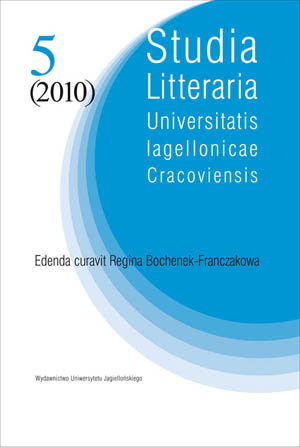Dramma per musica początku XX wieku – muzyczność powieści Mistrz i Małgorzata M. Bułhakowa w nawiązaniu do filozofii nowej muzyki Theodora Adorno
Dramma per musica of the Early 20th Century – the Theme of Music in Master and Margarita by M. Bulgakov with Reference to Theodor Adorno’s...
Author(s): Aleksandra SzramekSubject(s): Literary Texts
Published by: Wydawnictwo Uniwersytetu Jagiellońskiego
Keywords: Master and Margarita; Mikhail Bulgakov; music in literature; modern literary; New Hermeneutics; Theodor Adorno; music themes; new music’s chaos; sacrum and profanum
Summary/Abstract: The aim of the article is to present how musical themes create the artistic space in the novel Master and Margarita by Mikhail Bulgakov. The question „music in literature” became a significant part of discussion in modern literary and tendencies like intertextuality and intersemiotics. With the support of above-mentioned theories and with reference to postulates proposed by representative of New Hermeneutics in music, Theodor Adorno (1903–1969), I aim at prooving that music theme not only „beautifi es” artistic space (what concerns especially motives of folk and national songs and dances), or co-creates and supplements the plot, but can also imply deep philosophical and historiosophical meaning. According to Adorno, art never can be independent of historical and social changes. Consequently, a quality of an art refl ects a moral condition of society. In the novel Master and Margarita especially music themes vividly allude to reality which is devoid of freedom (as if reality in which Bulgakov indeed lived) and also to humankind losing morality at a critical historic moment. „Grotesque” steps, improvisation and deconstruction of time in „forbidden music” (in Soviet times the term included particularly jazz and fokstrot) are the elements of musical composition which enrich novel’s semantics. On the one hand, they correspond with perversion and chaos of new times. On the other hand, they reveal a human desire for freedom. Apart from historical aspects, the music themes in the text appear together with the names of composers (the most significant among characters-composers are Berlioz and doctor Stravinsky), titles of works or their theme. Music is suggested by structural elements: polyphony, variation, depersonalization, dodecaphony, also by philosophical laugh, crying, gesture and shock. Due to dynamics and expressionism, an atmosphere of the end of old world is created and the lunacy of upcoming one is shown. Meanwhile, a famous new music’s chaos is closed by the revaluation and orderliness. In accordance with the main novel’s truth – „everything will be like it should be, that is how a world is constructed” – sacrum and profanum would finally find its’ place. Suggestive reflection of that truth can be found in metaphor of symphony proposed in the article.
Journal: Studia Litteraria Universitatis Iagellonicae Cracoviensis
- Issue Year: 2010
- Issue No: 5
- Page Range: 133-151
- Page Count: 19
- Language: Polish

